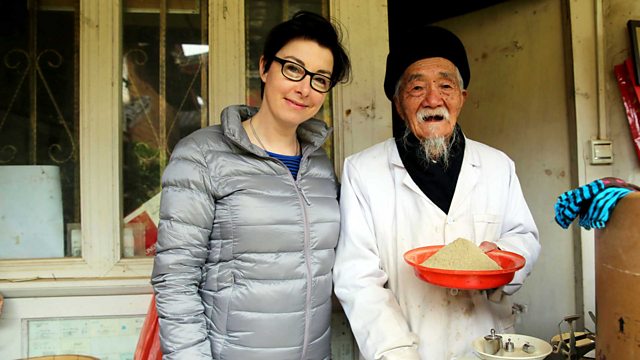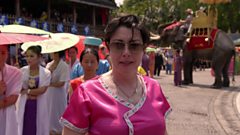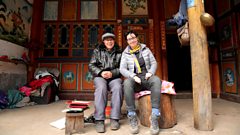
Episode 4
Sue Perkins's journey up south east Asia's greatest river concludes as she reaches China. She travels through Yunnan province to the Tibetan Plateau, home of the Mekong's source.
In this fourth and final episode, Sue reaches her final destination - China, home to the source of the Mekong. Here, change is sweeping through faster than any other Mekong nation, as China's economic miracle transforms even the remotest regions.
Arriving in Yunnan's tropical south western region of Xishuangbanna, Sue discovers how this once remote and sleepy region is now home to a booming tourist industry, with the indigenous Dai tribe at its heart. To the Dai, water is holy, the physical and spiritual source of life. Thousands of Han Chinese - who make up 92 per cent of China's population - flock to the Dai Minority Park, a Disneyfied version of an ancient Dai village, where they take part in a traditional water splashing ceremony. After decades of communism, the park represents China's renewed interest in the colourful melting pot of peoples that actually make up modern China, providing a must-see holiday destination for its burgeoning middle class.
Leaving the Dai Park, Sue climbs higher into the foothills of Xishuangbanna to discover how the Aini tribe are adapting to a changing China. The Aini have farmed pu'er tea for 2,000 years - suddenly they can become rich from its harvest, as China's newly wealthy professionals buy up this now fashionable delicacy.
But as China tries to work out what is significant from its past and what it should take into its future, some people feel this rush to modernity is threatening what little remains of ancient traditions and beliefs. Sue meets Li Jin Mei, who is desperately trying to preserve what is left of her Aini culture.
Travelling further along the river's valleys and foothills, Sue reaches the town of Baisha under the shadow of the Himalayas. Home to the Naxi people, this region is famous for its botanists and herbalists, made popular by Victorian plant hunters such as Joseph Rock. Sue attends a consultation with the renowned Naxi Chinese herbalist Dr Ho and explores his magnificent herbal garden.
Climbing higher and ever closer to the source, Sue encounters her first taste of Tibetan life in the village of Cizhong. French missionaries came here in 1850, bringing the Catholic gospel and converting, over time, 80 per cent of this village to Catholicism. Sue meets Mr Xiao Jie Yi, whose humbling story relates how his Catholic faith carried him through 30 years of hard labour during Mao's Cultural Revolution.
In modern China, Cizhong is facing a new, even more dramatic change - a hydroelectric dam is being built close by, bringing with it construction along the river's banks, landslides and the prospect of flooding. Six mega dams are already in service on the Mekong in Yunnan, generating the equivalent of enough electricity to light up London for three years. But the human and ecological cost here and downstream is yet to be calculated - already more than 100,000 ethnic people were displaced to make way for the dams.
Finally, after nearly 3,000 miles, Sue embarks on the last leg of her epic journey, arriving high up on the Tibetan Plateau in Qinghai province, close to the source of the Mekong. In a life-changing experience, she is immersed in the lives of a family of Tibetan yak herders, and joins a group of nuns as they make an offering to the water gods for their protection. Here, at the point where the Mekong's waters first filter into the lives of people, Sue reveals the eternal bond between humans, gods and this mighty river.
Last on
More episodes
Previous
Next
You are at the last episode
Clip
-
![]()
The Dai water splashing event
Duration: 02:43
Credits
| Role | Contributor |
|---|---|
| Presenter | Sue Perkins |
| Executive Producer | Lucy Carter |
| Director | Vicky Hinners |
| Producer | Vicky Hinners |
| Production Company | Indus Films |


